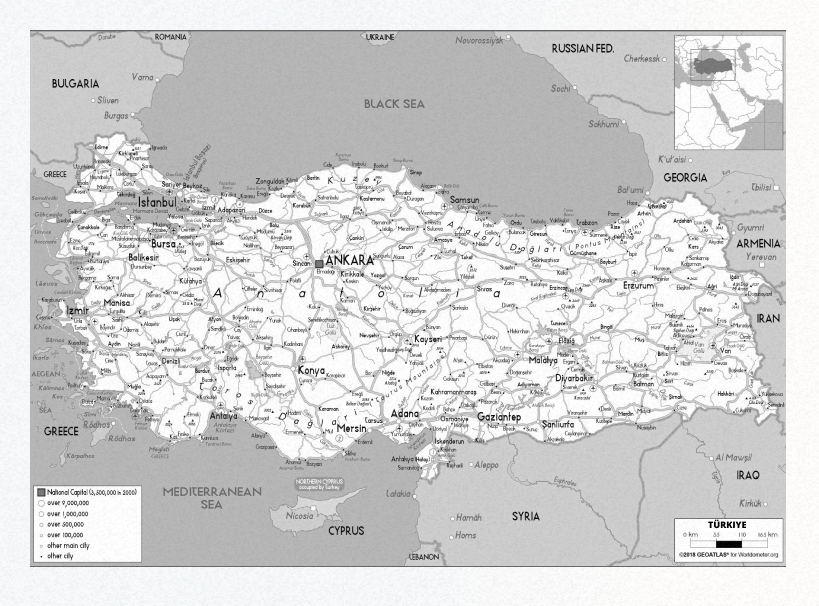Market Spotlight:
Türkiye

Factum Scale:
-
Türkiye is ranked 34th out of 190 countries on the World Bank’s Ease of Doing Business Score, making it one of the most business-friendly markets in the world.
-
Türkiye boasts a favorable geostrategic position as a gateway between Europe, Northern Africa, the Middle East, and Central Asia creating access to a population of 1.5 billion with a market value of USD 20 trillion.
-
The government of Türkiye has and continues to enact major infrastructure projects attracting foreign investment and creating ample business opportunities.
-
However, Türkiye continues to be burdened by a currency crisis leading to a weakening Turkish lira, high inflation, high energy import costs, and volatile unemployment. Foreign investors may find bargain investment opportunities.
Tariffs & Regulations
Factum Scale:
-
Türkiye and the European Union have a Customs Union that adopts the EUs common external tariff on industrial products and eliminates custom duties on their bilateral trade.
-
Türkiye has a large portfolio of free trade agreements (FTAs) with 22 active FTAs, current negotiations for 17 FTAs, and a newly-launched initiative to begin discussions with 9 new countries/blocs.
-
Türkiye places high tariff protection on agricultural products, however the EU Customs Union agreement and other free-trade agreements allows duty-free access to Türkiye’s largest trading partners.
-
Türkiye is poised to become a significant regional player in Europe and the Middle East, especially in the agricultural and energy sectors.
Fluency in English
Factum Scale:
-
Türkiye, ranked 64 out of 111 countries in terms of English fluency, has a ‘low’ English proficiency, and ranks 2nd to last in Europe, according to the Education First English Proficiency Index. Be prepared with an interpreter when doing business here.
-
The official language of Türkiye, Turkish, is spoken by nearly 90% of the population (~75 million), with infusions of Kurdish (11%), Arabic (1%), and other languages.
-
In 2013, the Curricular Innovation in Teaching English as a Foreign Language was introduced, where students as early as grade 2 began learning the language to boost national proficiency levels.
Culture and Business Etiquette
Factum Scale:
-
As a predominantly Islamic country, it is vital to schedule meetings around the five daily prayer times and pay attention to important holidays like Ramadan.
-
Punctuality is important and expected of foreign executives and visitors, even if the host is not on time.
-
It’s wise to offer your product or services multiple times as an initial decline is common. To sincerely refuse an offer, it’s common to place your hand on your chest while doing so.
-
When touching, gesturing, or in other actions, it is critical to use your right or both hands when doing so. In Islamic principles, the left hand symbolizes removal of dirt or for cleaning and should always be avoided.
Economic Stability
Factum Scale:
-
Türkiye is the 104th freest economy out of 177 markets analyzed, and ranks 22nd out of 25 in the region.
-
The country has a very high human development score of 0.838, ranking 48th out of 191 countries, allowing for a high quality of life in health, education, and income opportunity.
-
In 2023, Türkiye experienced two devastating earthquakes creating an economic drag on top of an already looming currency crisis. The macro situation for Türkiye remains risky although recent political developments may stabilize economic uncertainty.
-
The income inequality amongst the Turkish population is relatively equidistant in the world, similar to the United States on the Gini Index.
Labor
Factum Scale:
-
Türkiye boasts an abundant youthful workforce with half of the population below the age of 31.
-
The Turkish labor force participation rate is 51.4%, lower than the world average rate of 60%, and the lowest among OECD countries. Unemployment is a national issue.
-
The labor force in Türkiye is highly educated with 5% of the working age population having completed some level of advanced education.
-
Among OECD countries, Türkiye has the highest broad labor underutilization rates (due to low participation of women), the 3rd highest market insecurity, 2nd highest job strain, and ranks below the OECD average in terms of income rates.


